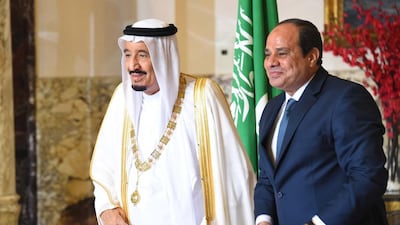One doesn’t need statistics to realise that the situation in the Arab world is at an unprecedentedly disastrous level, with dismantled states, broken armies, raging terrorism and transborder militias. News of suicide bombings and fighting are prevalent. The Arab side of the Middle East seems abandoned and in ruins, heading towards more bloodshed, segmentation and poverty.
Ghassan Charbel, the editor in chief of Al Hayat, said that for all these reasons, a firm decision to stop the collapse is of the essence, and it had to come from Riyadh in view of its political and economic weight and its advanced standing among Arab and Islamic nations. The editorial coincided with King Salman’s visit to Egypt this week.
“The Saudi leadership was aware early on of the pivotal role that Egypt would play in any serious attempt to stop the Arab collapse,” he noted.
“Helping Egypt is of the essence, as well as strengthening the existing relationship with Cairo to lead to a strategic partnership that will allow both parties to ward off security challenges through a partnership against terrorism and against foreign interference that has wreaked havoc in most Arab states.”
King Salman’s visit, at the head of a high-level delegation of Saudi royals and officials, lays the foundation for long-term joint interests and a serious in-depth dialogue aimed at shaping plans to breathe new life into the Arab role in the region, as well as homogenous approaches to the relationship with regional powers, namely Turkey and Iran.
“King Salman’s visit to Egypt was rich with economic agreements and strong messages: Saudi’s colossal investments in Sinai, the new bridge, the visit to Al Azhar and to the Coptic pope and strong support for moderation and the fight against extremism,” he noted.
Also commenting on the Saudi king’s visit to Egypt, columnist Mashari Al Thaydi wrote in the pan-Arab daily Asharq Al Awsat: “The Saudi-Egyptian alliance provides protection for the Arab world and a guarantee for the interests of Arab peoples.”
For over a decade, Arab countries have experienced imbalance in favour of other powers. It culminated in the so-called Arab Spring, the political deluge that nearly engulfed all Arab states.
Under the current leadership, and with the support of Gulf states and especially Saudi Arabia, Egypt is striving to preserve the integrity and authority of its state institutions despite unrest in Sinai and other parts of the state due to religious terrorism.
The new alliance with Saudi Arabia would embolden it even further to continue the fight against fanaticism and terrorism.
For his part, the columnist Turki Al Dakheel wrote in the Saudi daily Okaz that the royal visit may be the most significant visit between two Arab countries in decades, based on the important decisions and agreements that ensued.
“Saudi Arabia and Egypt are the two main poles of the Arab world. Their integration and rapprochement pleases their friends as much as it frightens their enemies,” he wrote.
It is an alliance that comes as a necessity for the Middle East, especially in the wake of the obvious United States withdrawal from the region. Arab states can no longer rely on Washington to provide assurances, namely in relation to Iran.
King Salman had to make the bold decision to be the practical alternative to the US in this region and to begin working on shaping the nucleus of a regional Arab project that would provide deterrence and a balance of power against other countries, such as Iran, and against terrorist organisations.
This new Saudi-led step represents a strategic transformation and an unprecedented leap for a system that would ensure the stability that the Obama administration, or any other US administration, can no longer provide.
Translated by Racha Makarem
RMakarem@thenational.ae

